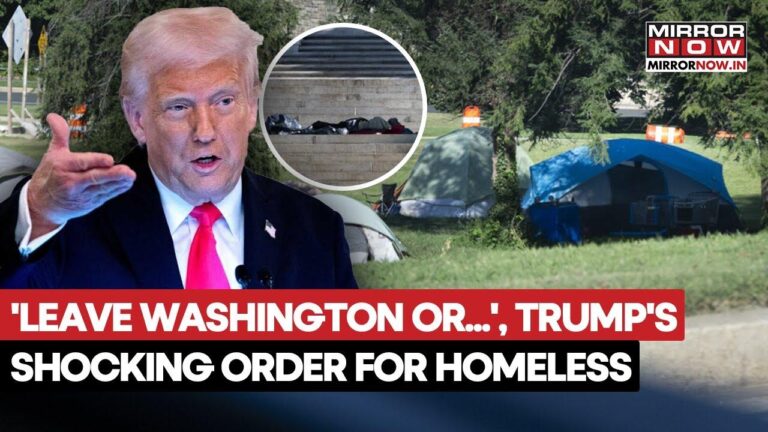Donald Trump’s Proposal to Clear Homeless Encampments in Washington, D.C.: A Controversial Approach Amid a Growing Crisis
Trump’s Initiative to Address Homelessness in the Nation’s Capital
Former President Donald Trump has unveiled a plan aimed at removing homeless encampments from public areas across Washington, D.C., citing concerns over public safety and urban revitalization. His strategy involves bolstering law enforcement efforts alongside the creation of temporary housing facilities designed to relocate individuals experiencing homelessness. Trump asserts that his approach seeks to balance enforcement with supportive social services, pledging close cooperation with local government to expedite implementation.
Core elements of the proposal include:
- Utilization of federal assets to support D.C. authorities in clearing encampments.
- Construction and expansion of emergency shelters and transitional housing units.
- Initiatives targeting addiction recovery and mental health treatment.
- Strengthened partnerships between governmental bodies and nonprofit organizations.
| Component | Description |
|---|---|
| Law Enforcement | Increased police patrols and systematic removal of encampments |
| Housing Solutions | Development of temporary shelters and transitional housing |
| Support Services | Programs addressing mental health and substance abuse |
| Funding & Collaboration | Joint efforts between federal and local governments |
Concerns Raised by Advocates: Potential Risks of Forced Evictions
Advocacy groups and social policy experts have voiced strong opposition to the eviction plan, warning that displacing homeless individuals without sufficient support could worsen the crisis. They argue that removing people from public spaces is a superficial fix that fails to address root causes such as lack of affordable housing, mental health challenges, and systemic poverty. A spokesperson from a prominent homelessness nonprofit remarked, “Clearing encampments without comprehensive solutions is like treating symptoms without curing the disease.”
Critics also caution that the initiative may overwhelm existing community resources. Emergency shelters, healthcare providers, and law enforcement agencies are already stretched thin, and a sudden influx of displaced individuals could strain these systems further. The table below outlines current capacities alongside projected increases in demand based on recent data:
| Resource | Current Capacity | Projected Increase in Demand | Anticipated Shortfall |
|---|---|---|---|
| Shelter Beds | 1,200 | +500 | 350 |
| Mental Health Services | 850 patients/month | +220 | 120 |
| Emergency Medical Care | 1,600 visits/month | +400 | 180 |
- Escalation of homelessness: Forced removals risk pushing individuals into more unstable and unsafe living conditions.
- Resource overload: Nonprofits and public services may be unable to meet the surge in demand.
- Ethical and legal dilemmas: Concerns about potential violations of human rights and due process.
Calls from Local Leaders for Holistic and Compassionate Solutions
City officials and community leaders have urged for comprehensive strategies that prioritize support over displacement. They emphasize that eviction without adequate safety nets will exacerbate the humanitarian emergency facing Washington, D.C. Instead, they advocate for integrated programs that combine immediate shelter access, healthcare services, and long-term housing solutions.
Three pillars recommended by local authorities include:
- Provision of emergency accommodations that uphold safety and human dignity.
- Expanded mental health and addiction treatment tailored to the needs of vulnerable populations.
- Long-term reintegration initiatives focusing on employment, legal assistance, and community engagement.
| Support Area | Suggested Actions |
|---|---|
| Housing | Temporary shelters, affordable housing development |
| Healthcare | Mental health clinics, substance abuse recovery centers |
| Social Services | Job training programs, legal aid, community integration efforts |
Expert Insights: Emphasizing Affordable Housing and Mental Health Care
Urban planners and public health experts stress that sustainable solutions to homelessness must prioritize affordable housing. Research indicates that mixed-income housing developments and expanded housing voucher programs significantly reduce homelessness by providing stable living environments. Eviction without these alternatives risks perpetuating cycles of instability.
Moreover, mental health professionals highlight the critical role of enhanced mental health services. Many individuals experiencing homelessness suffer from untreated psychiatric conditions, substance dependency, and trauma, which impede their ability to secure housing. Experts recommend a multifaceted approach including:
- Increasing availability of specialized mental health and addiction treatment clinics.
- Deploying mobile outreach teams to engage homeless individuals directly in their environments.
- Training frontline service providers to recognize and respond to mental health crises effectively.
Conclusion: Navigating the Complexities of Homelessness Policy in Washington, D.C.
The discourse surrounding homelessness in Washington, D.C. has intensified with former President Donald Trump’s announcement to clear homeless encampments. This proposal has sparked a contentious debate balancing public safety concerns with the rights and welfare of vulnerable populations. As local authorities and advocacy groups push for more compassionate, comprehensive solutions, the coming months will be critical in shaping policies that address both immediate needs and long-term stability for those experiencing homelessness. Stakeholders nationwide will be watching closely to see how these developments influence broader strategies tackling homelessness across the United States.







